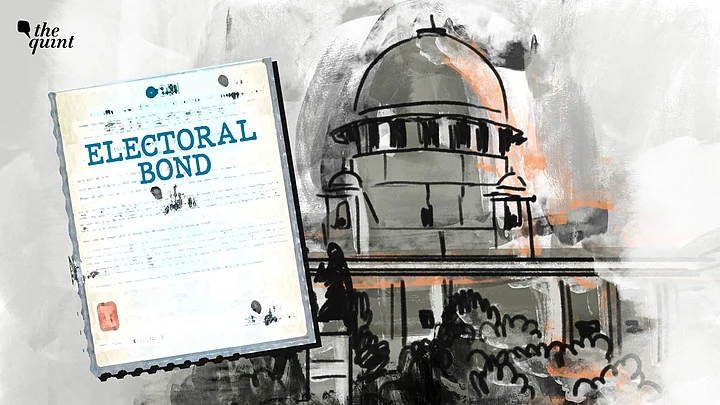A five-judge Constitution Bench of the Hon’ble Supreme Court (SC) on 15 February 2024 struck down unanimously the electoral bonds scheme (EB), notified on 2 January 2018 by the Government of India.
Two separate concurring judgments were delivered. One by Hon’ble the Chief Justice of India (CJI), along with Hon’ble Justice B R Gavai, Hon’ble Justice J B Pardiwala, and Hon’ble Justice Manoj Misra; the other concurring judgment, with different reasonings, was delivered by Hon’ble Justice Sanjiv Khanna.
In a path-breaking verdict, the voters' right to information (on political funding) has reigned supreme under Article 19 (1) (a) of the Constitution. Correspondingly, political parties receiving funds through EBs will now be required to disclose the donor’s name.
To balance competing interests (the voters' right to know and the donors' right to privacy), the SC applied the double proportionality standard; it ruled that “transparency – not secrecy – in the funding of political parties is a prerequisite for a free and fair election.” The verdict makes the voter the most important stakeholder in the election process.
The apex court's directions are that:
a) The State Bank of India (SBI) shall forthwith stop issuing EBs
b) The SBI shall provide full details of all EBs to the Election Commission of India (ECI) for the period between 12 April 2019 and 15 February 2024, with all the names of donors and donees by 6 March 2024
c) The ECI shall publish the entire information by 13 March 2024 on its official website
d) Un-encashed EBs within validity (15 days) shall be refunded to the donor’s bank account
Thus, on 13 March 2024 entire list of EBs will be revealed. The effect will be salutary. Opacity and other dubious means of funding elections have been the bane of our political system.
Approximately Rs 17,000 crores have so far been garnered by political parties through EBs since 2019. What political parties have done with these funds may well be subject to investigation one day. As the concurring judgment authored by Hon’ble Justice Sanjiv Khanna articulated in paragraph 46 (page 37) [running page 195], inter-alia:
“…political contributions for a quid pro quo may amount to money laundering, as defined under the Prevention of Money Laundering Act, 2002…by ensuring anonymity, the policy ensures that the money laundering on account of quid pro quo or illegal connection escapes eyeballs of public…”
These words of wisdom from the apex court ought to act as a beacon of light for all the stakeholders. Can it be ruled out that a part of the funds collected through EBs are not proceeds of crime?
While quashing the entire scheme, the Supreme Court also struck down all the amendments in law, that were brought about in proviso to Section 29C (1) of the Representation of the People Act 1951, Section 182 (3) of the Companies Act, 2013, Section 13A (b) of the Income Tax Act, 1961, and Section 31 (3) of the Reserve Bank of India Act, 1943, as violative of Article 19 (1) (a) of the Indian Constitution.
These amendments [enacted through the Finance Bill in 2017] were necessary to make EBs opaque.
For example, the requirement of maintaining books of accounts was knocked out; the disclosure of individual donors was dispensed with; the upper limit of political funding was removed; and the SBI was permitted to issue a demand promissory note payable to a bearer which is the exclusive monopoly of the Reserve Bank of India under the RBI Act, 1934. These amendments were enacted through the Finance Bill, 2017, under Article 110 of the Constitution, brazenly might I add.
The Indian voters, thanks to the Supreme Court, have been given what is owed to them. The right to information under Article 19(1)(a) has reigned supreme and has overshadowed the right to privacy, i.e., the privacy of the voter regarding who to fund for an election.
The Hon’ble Chief Justice of India D Y Chandrachud, in his leading judgment (also on behalf of Hon’ble Justice B R Gavai, Hon’ble Justice J B Pardiwala, and Hon’ble Justice Manoj Misra) expressed concern in the following words:
“…would we remain a democracy if the elected do not heed to the hue and cry of the needy? We have established the close relationship between money and politics above where we explained the importance of money for entry to politics, for winning elections, and for remaining in power, that being the case the question that we ask ourselves is whether the elected would truly be responsive to the electorate if companies which bring with them huge finances and engage in quid pro quo arrangements with parties are permitted to contribute unlimited amounts….”
The Court, therefore, ruled that the right to information of a voter trumps the right of a donor to not disclose their identity.
It went further to record:
“…even the learned Solicitor General did not deny during the course of the hearings that corporate donations are made to receive favours through quid pro quo arrangements.”
The verdict has provided oxygen to India’s electoral politics. The unlimited contribution with anonymity in the electoral bonds scheme was particularly pernicious without any accountability or scrutiny.
The scheme was dubious ab initio and has been justifiably quashed. And today, the majesty of the Supreme Court shines in all its splendour.
(The author is a Senior Advocate at the Supreme Court and a former Additional Solicitor General of India. This is an opinion piece and the views expressed are the author’s own. The Quint neither endorses nor is responsible for them.)
